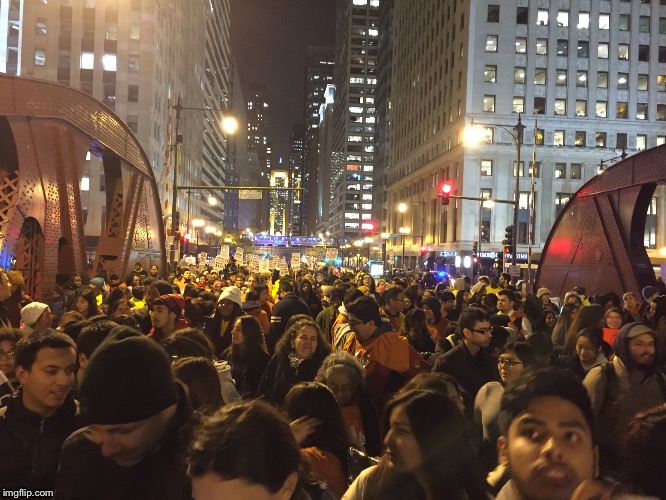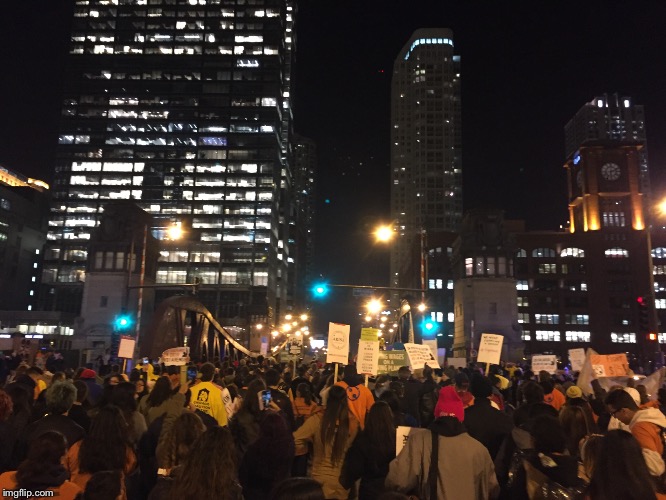General Discussion
Related: Editorials & Other Articles, Issue Forums, Alliance Forums, Region ForumsThomas Piketty: income inequality due to declines in unions and minimum wage, not globalization.
Piketty started things off by claiming that the received wisdom (at least among economists) for why inequality has increased, globalization and skill-biased technical change, simply don’t explain the phenomena very well. Neither can explain the rise of the top 1%, nor can they explain the international variation in the extent of tail inequality. Piketty did credit the role of educational exclusion in closing off access to the most elite precincts of the economy, as shown by the new Chetty, Saez, et al findings on the extent to which top universities draw their undergraduate students from rich households. But he continued on to a discussion of how the Piketty, Saez, and Stantcheva (2014) findings on wage bargaining and top income shares can’t be squared with a marginal-productivity story of wage-setting. He mentioned norms of corporate governance shifting in favor of managers and owners by way of explaining tail inequality, as well as erosion of unions and the minimum wage as explanations for stagnant or falling wages at the bottom and middle of the distribution. He closed with what I consider a profound restatement of why Capital in the 21st Century is such an important book:The gap between [the] official discourse and what’s actually going on is enormous. The tendency is for the winner to justify inequality with meritocracy. It’s important to put these claims up for public discussion.
... Piketty’s rebuttal devastating: that progressive taxation was invented in America and that it flourished here as a complement to free and equal quality public education, not a substitute. Together, the two did not destroy capitalism. Quite the contrary: the period of their efflorescence, complete with confiscatory estate taxation, saw the highest aggregate and per-capita growth across the income distribution of any time in American history.
Piketty himself said it best: “The idea that we need to keep inequality to preserve incentives is just not consistent with reality.”
http://steinbaum.blogspot.com/2015/11/free-market-dogmatism-still-going_8.html
Faux pas
(16,236 posts)Wounded Bear
(64,010 posts)we need to stop with the passive voice. Unions didn't "die." They were murdered by the corporations.
ananda
(34,606 posts)... globalization is definitely a problem.
pampango
(24,692 posts)Progressive countries with strong unions and minimum wages are much more "globalized" than the US. They also have much stronger middle classes and much equal distributions of income than the relatively "unglobalized" US.
FDR inherited a very "unglobalized" world and steered it towards becoming a globalized one.
ananda
(34,606 posts)... in my view.
It's just that right now there's no way in hell that globalization
is going to be in the right hands.
This is not a matter of parsing how many countries are globalized,
and out of those, to what degree each is globalized.
Take the USA. It's the manner of globalization and the philosophy
behind it -- pro corporate, pro looting, anti-environment, anti-union,
and backed by the MIC.
hifiguy
(33,688 posts)When the entire system is painstakingly rigged in every detail to benefit only a few (see TTP/TISA), enormous problems arise very quickly. And Piketty has also argued that controls on the transnational relocation of capital are also a necessary part of a well-designed global system.
WhaTHellsgoingonhere
(5,252 posts)Sucks when we have a 2-Party system and both are hastening their demise.
mmonk
(52,589 posts)that back the workers and unionization and force wages downward.
WhaTHellsgoingonhere
(5,252 posts)...in Chicago, today.
I've been ranting to my friends about the several ills this economy suffers, laying the blame squarely at the feet of libertarian ideas that many "liberal democrats" espouse unwittingly. The don't get it and, again unwittingly, make the libertarian case when responding.
I've now concluded that it's best to support one, easy to argue movement than play whack-a-mole. Fight for 15, I can't think of a better movement that will do more for the middle class while being significantly encompassing.
riderinthestorm
(23,272 posts)please post an update and thanks for leading the charge!
![]()
WhaTHellsgoingonhere
(5,252 posts)Hundreds, up to 1000, and from various unions joined Fight For 15 in Chicago. Wonderful solidarity. We took it on the road through across the Chicago River and back. When I got home, turned on Rachel. She showed several cities across the country with 25 demonstrators here, 50 there. Nothing from Chicago.


hifiguy
(33,688 posts)The potential across-the-board benefits are enormous. But the (huge) problems are twofold, though addressable: international capital mobility/flight has created huge incentives to race to the bottom, which means all the gains are concentrated in the hands of a very small number of people; a ludicrously inadequate taxation system does nothing to rectify the horrible results brought on by capital flight.
Which means you have a couple of tenths of one percent of the world population receiving ALL of the benefits.
The system is rigged for their benefit because they designed the system, which is Piketty's core argument in his invaluable book, which I heartily recommend to all DUers who care about economics and inequality. These days Piketty is always the smartest person in any room he is in.
moondust
(21,257 posts)Kinda depends on how you choose to define "globalization."
As long as transnational corporations can maximize their profitability by selling their goods and services at the highest prices in the richest countries on the planet while producing those goods and services in the cheapest labor markets on the planet, who ya gonna call?
Unions can strike all they want and governments can raise their minimum wage but the corps can play countries off each other and ship the jobs to the country whose self-serving "leaders" offer the best deal on cheap labor--perhaps including guarantees of protection from strikes and raises in wages!
I think that's the idea behind Jack Welch's barge: "Ideally, you'd have every plant you own on a barge to move with currencies and changes in the economy."
The2ndWheel
(7,947 posts)Government works when it's a monopoly.
